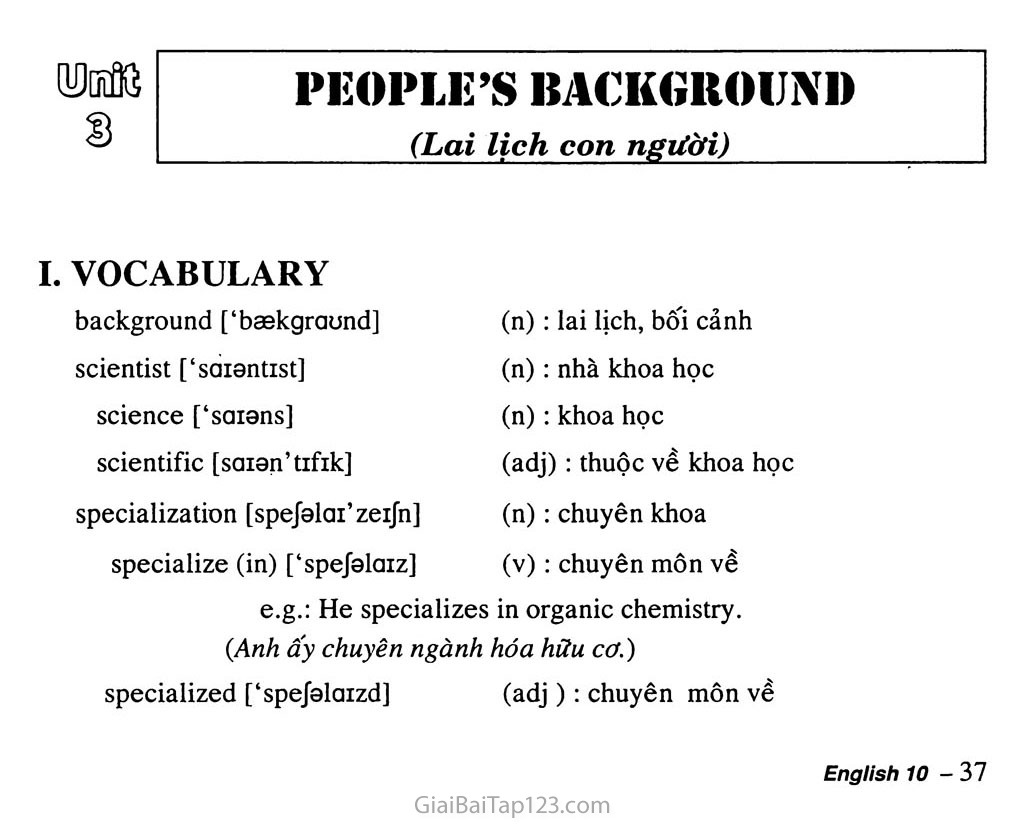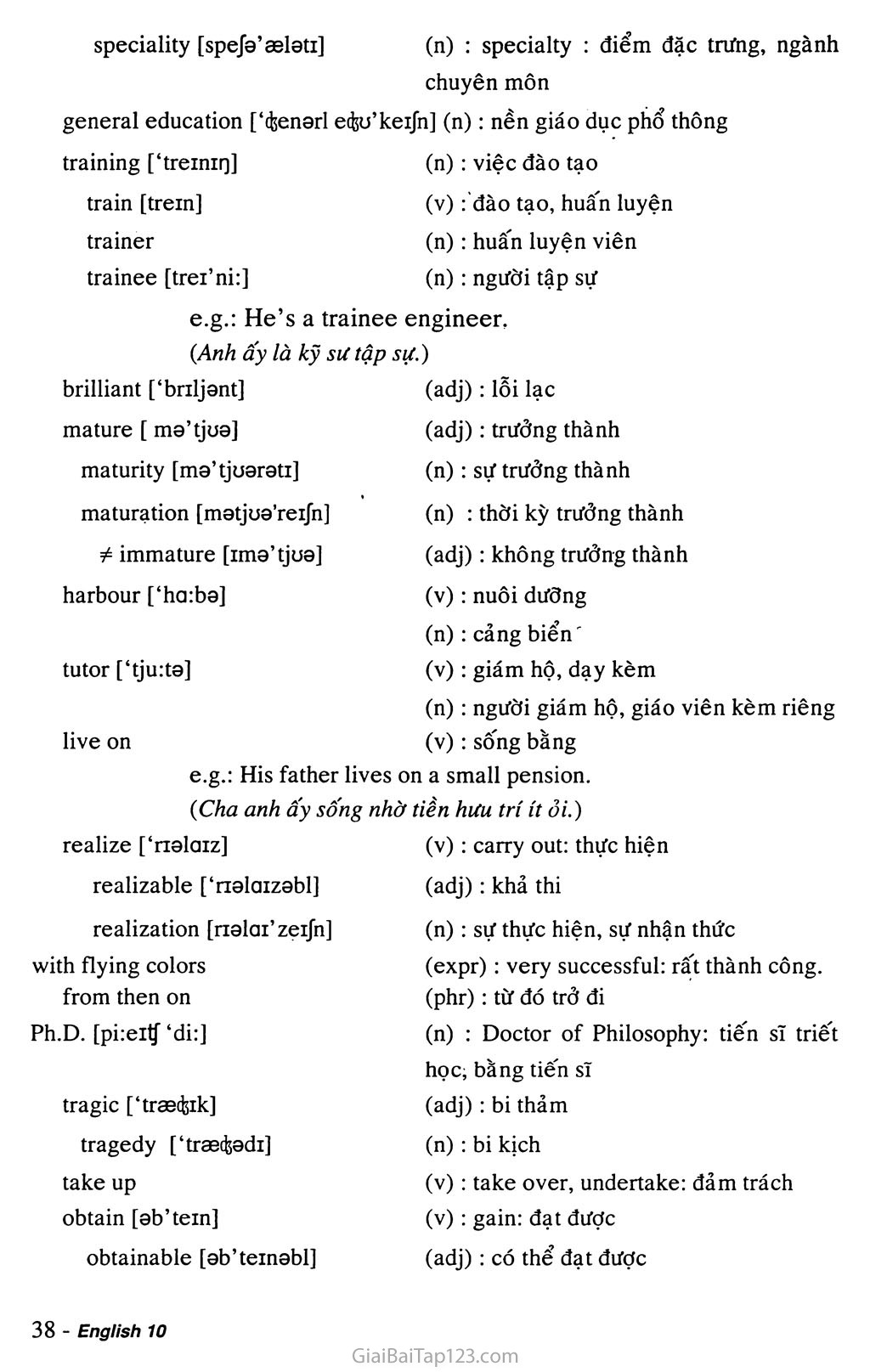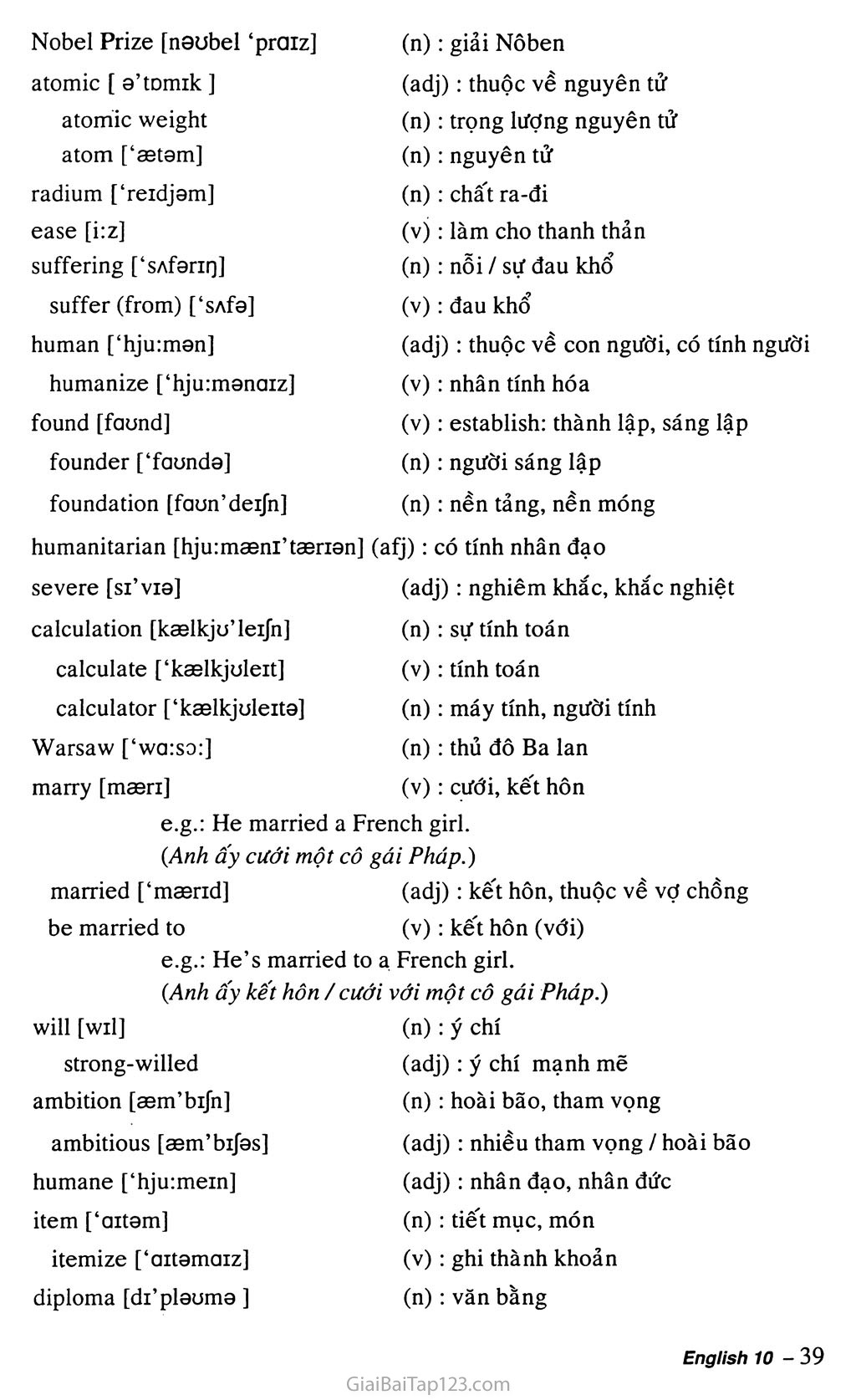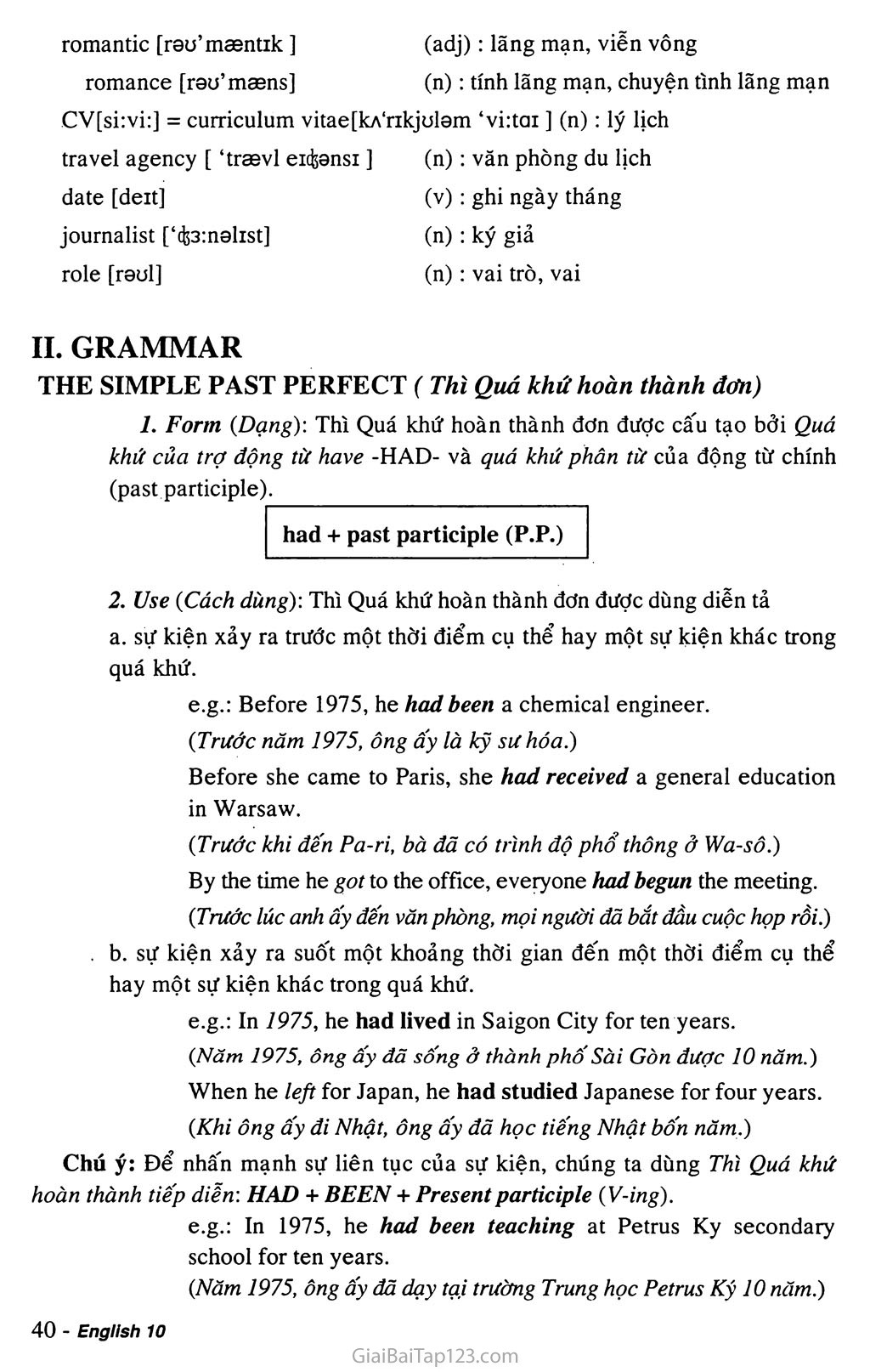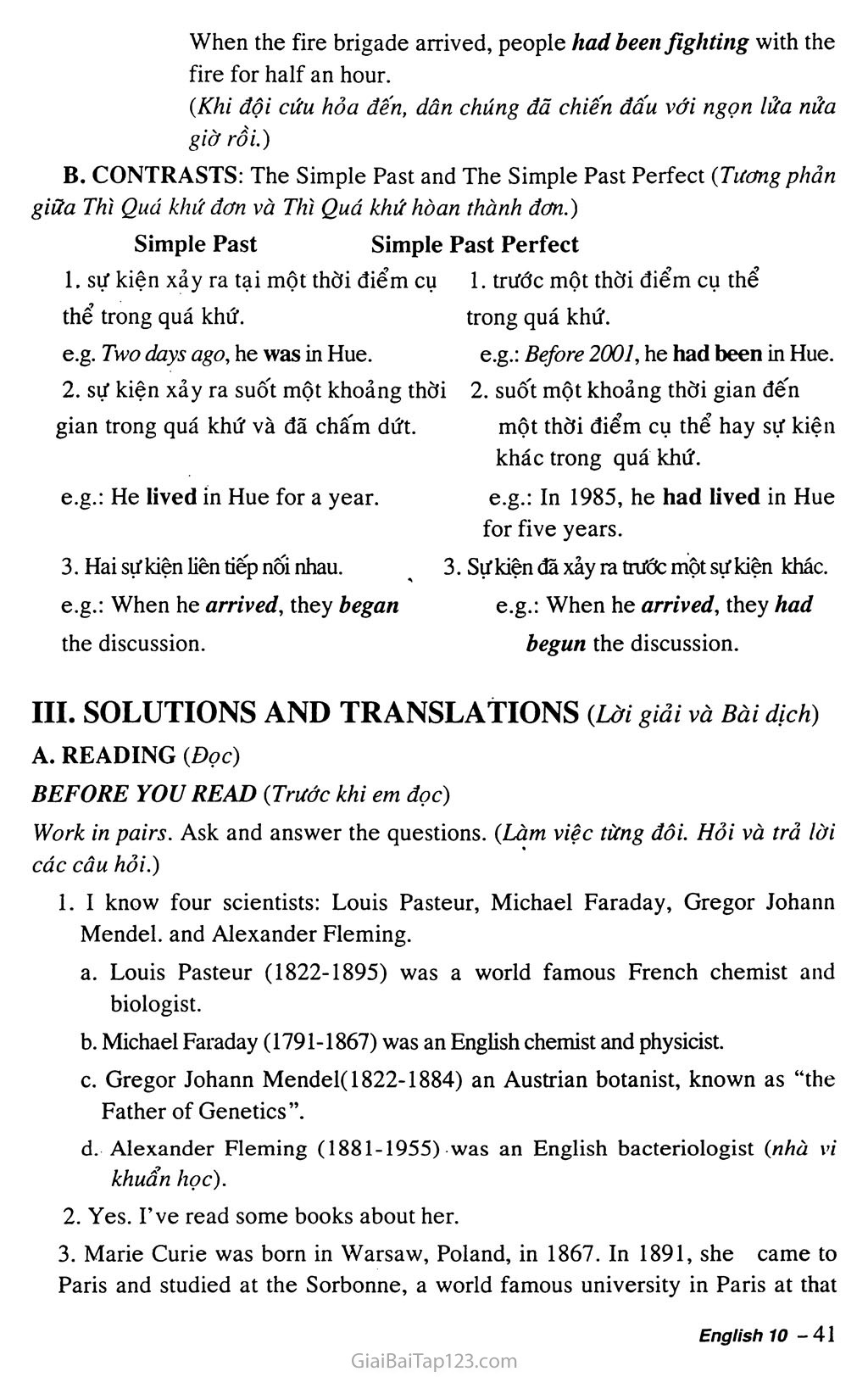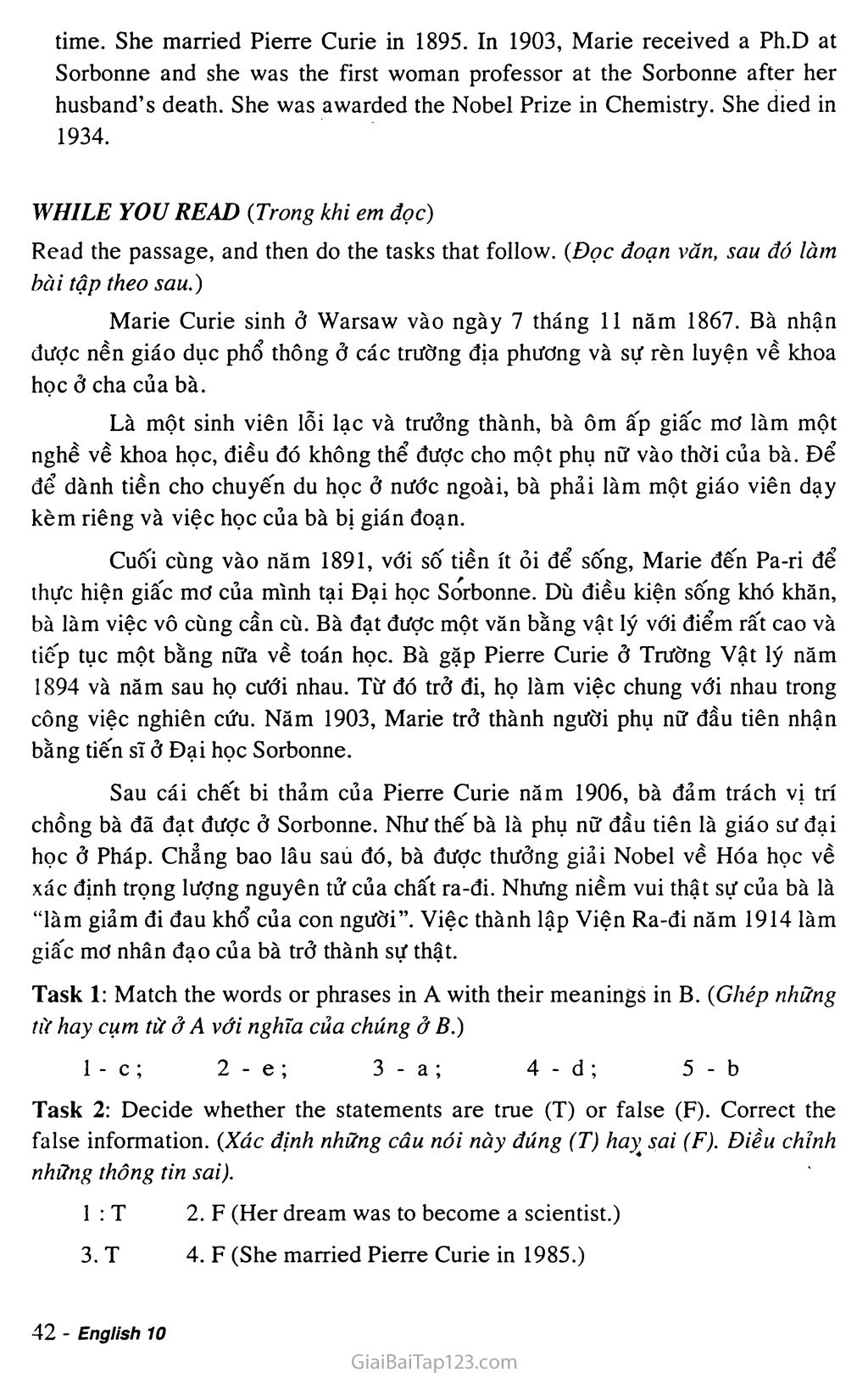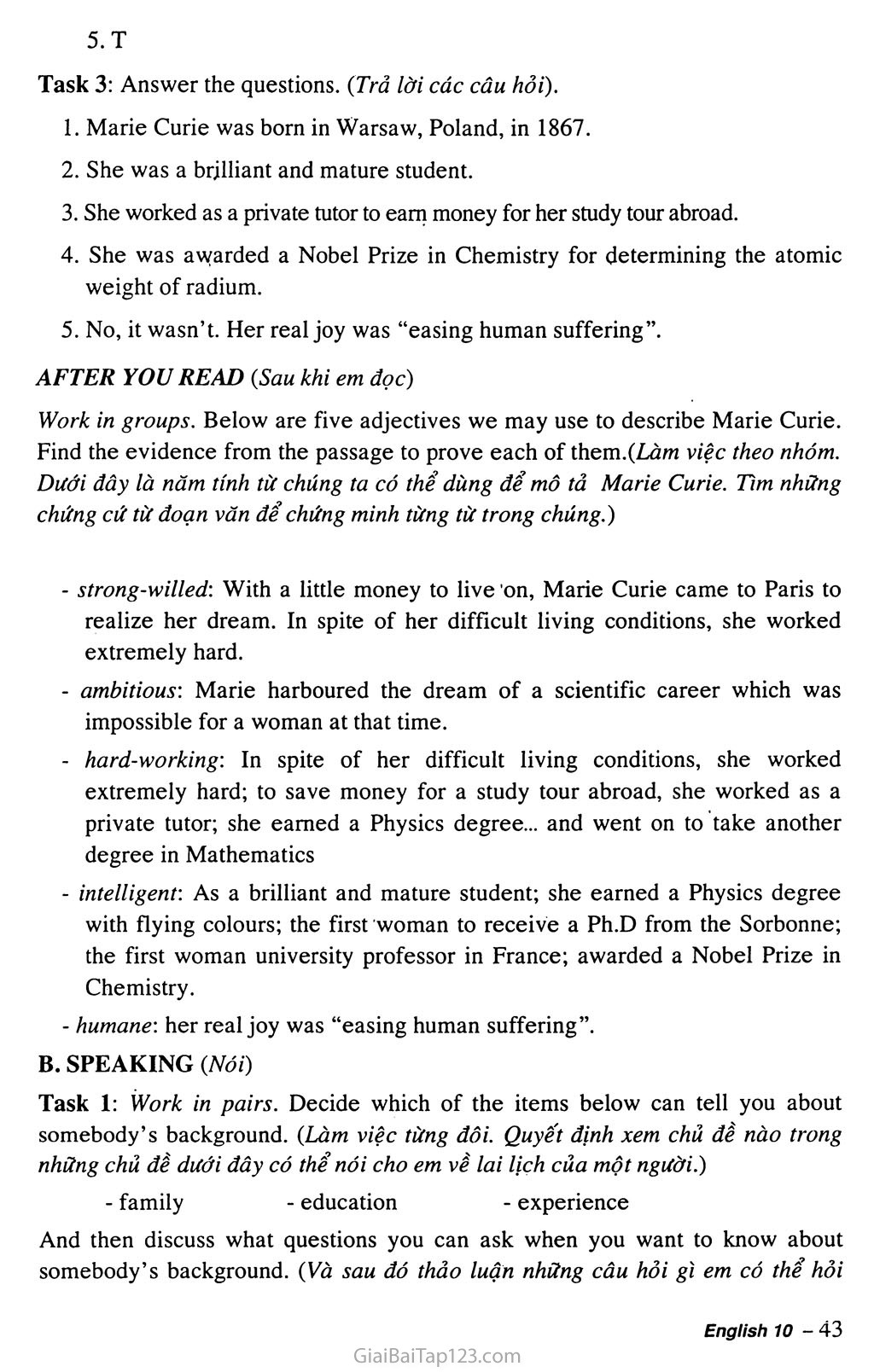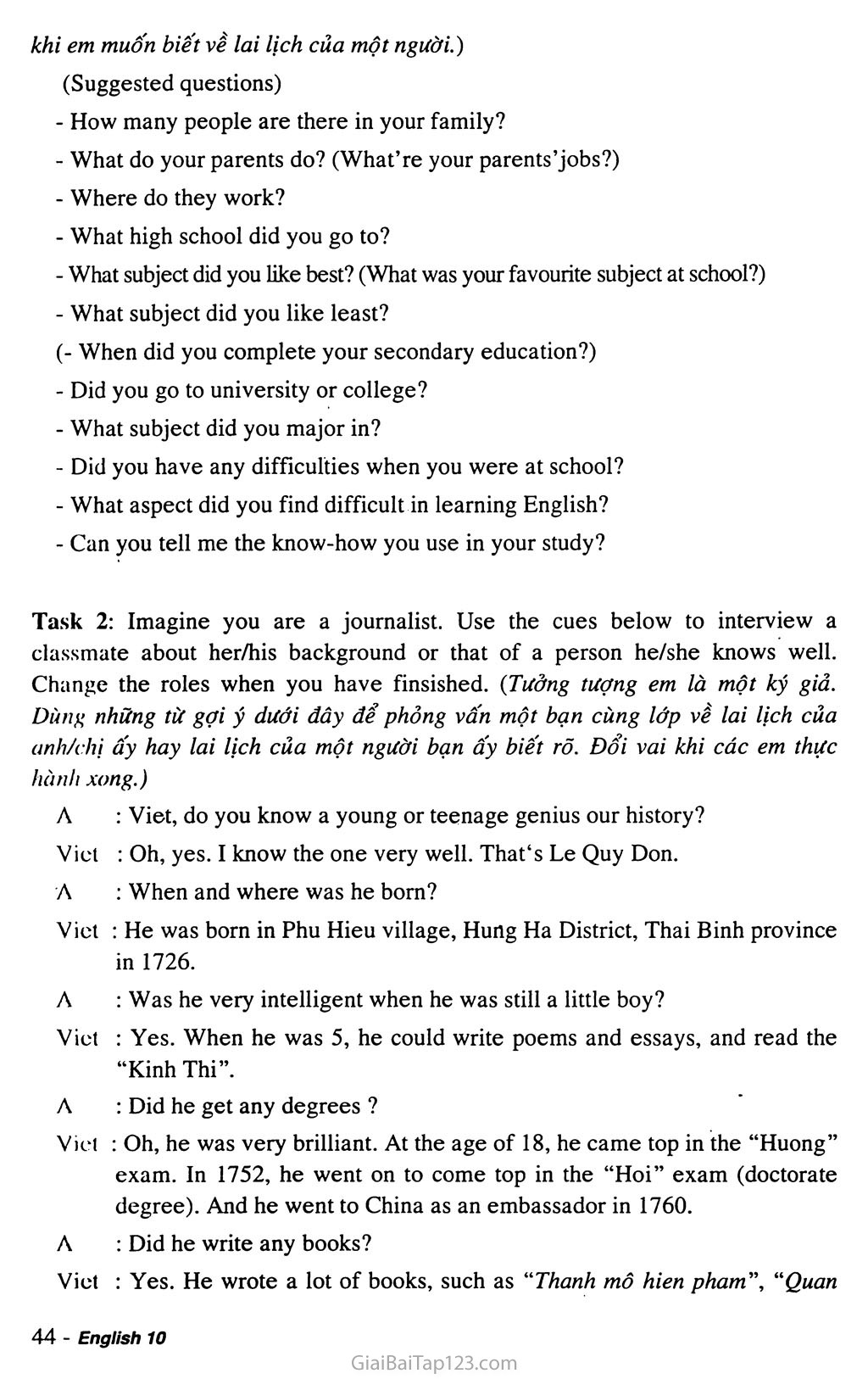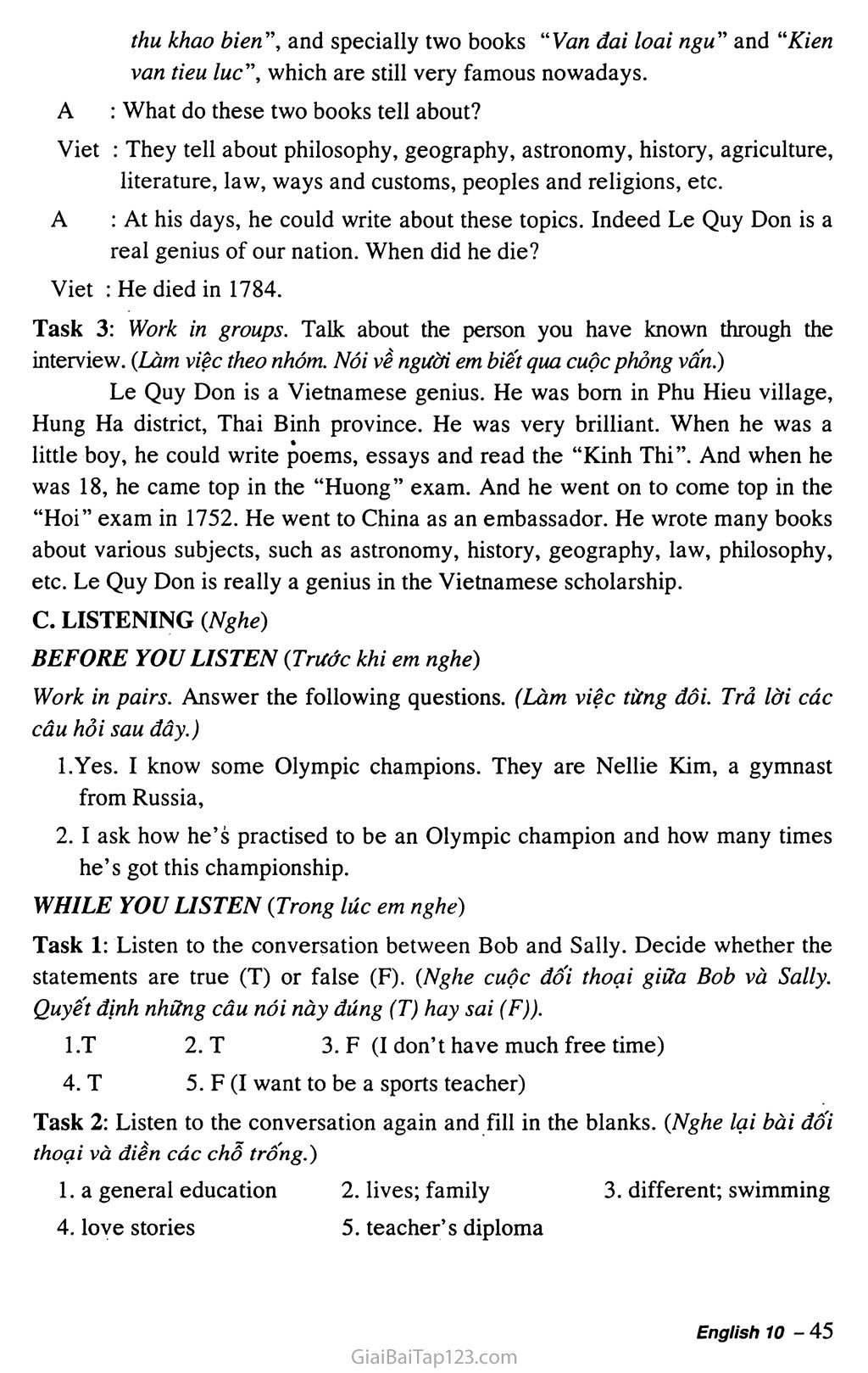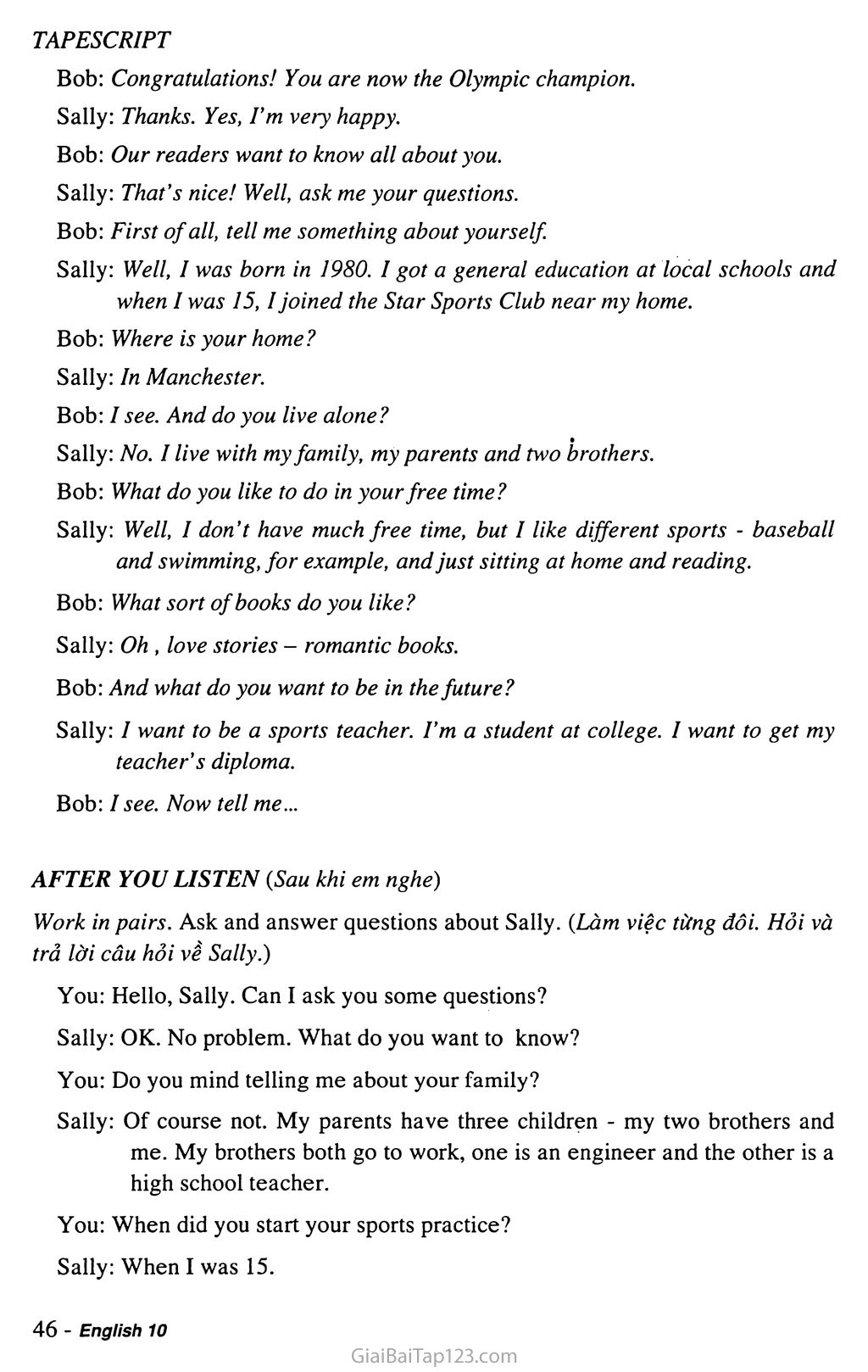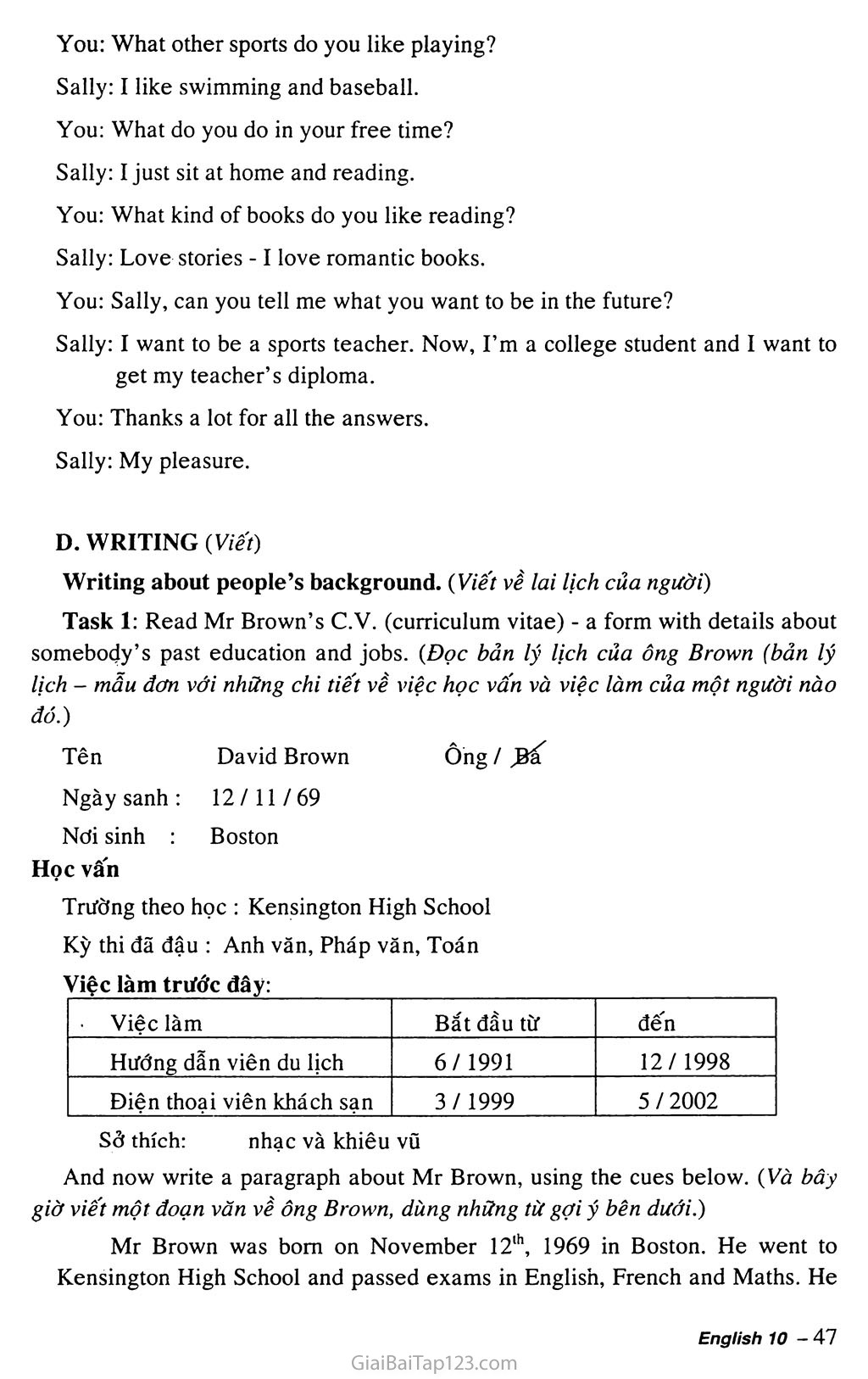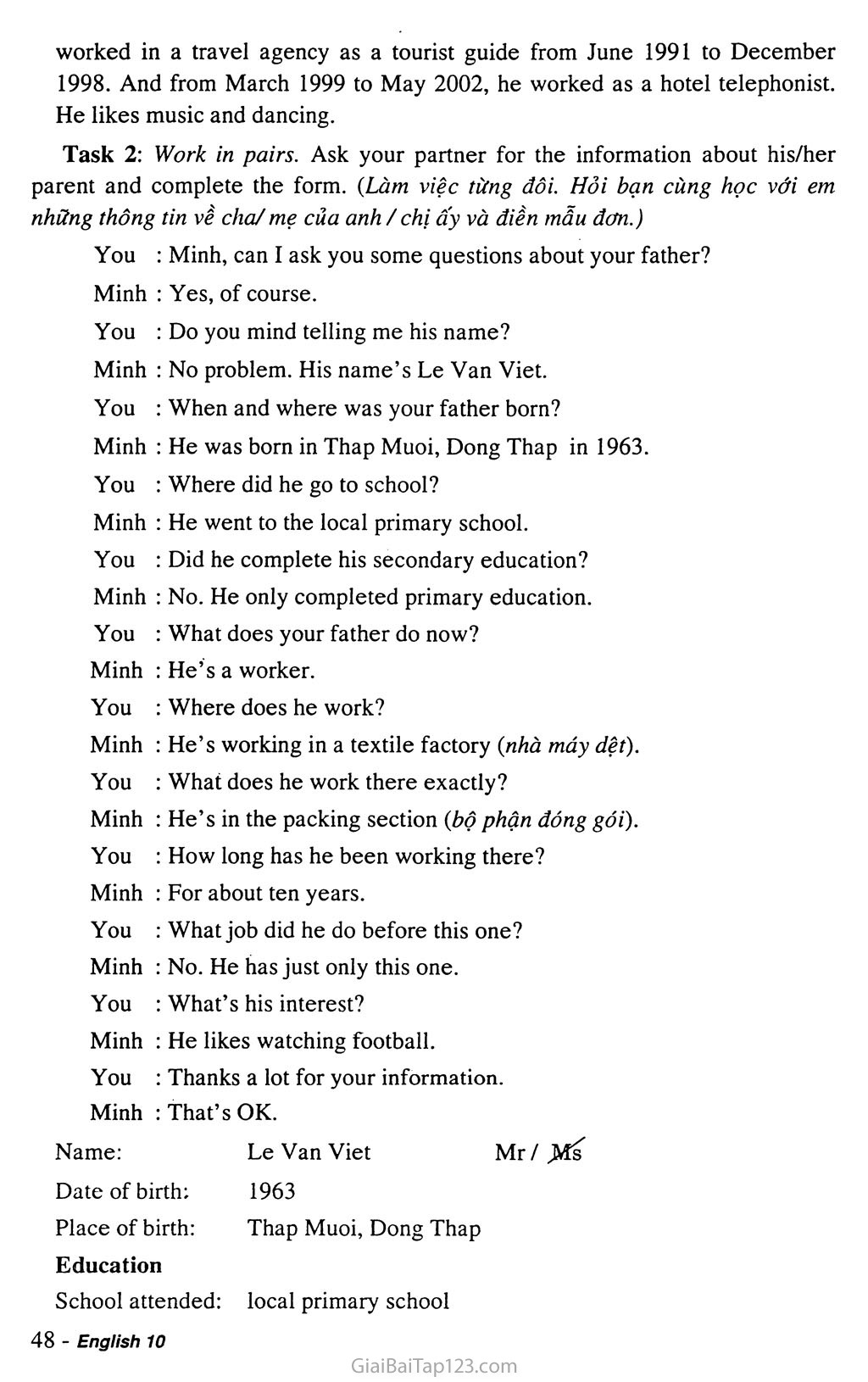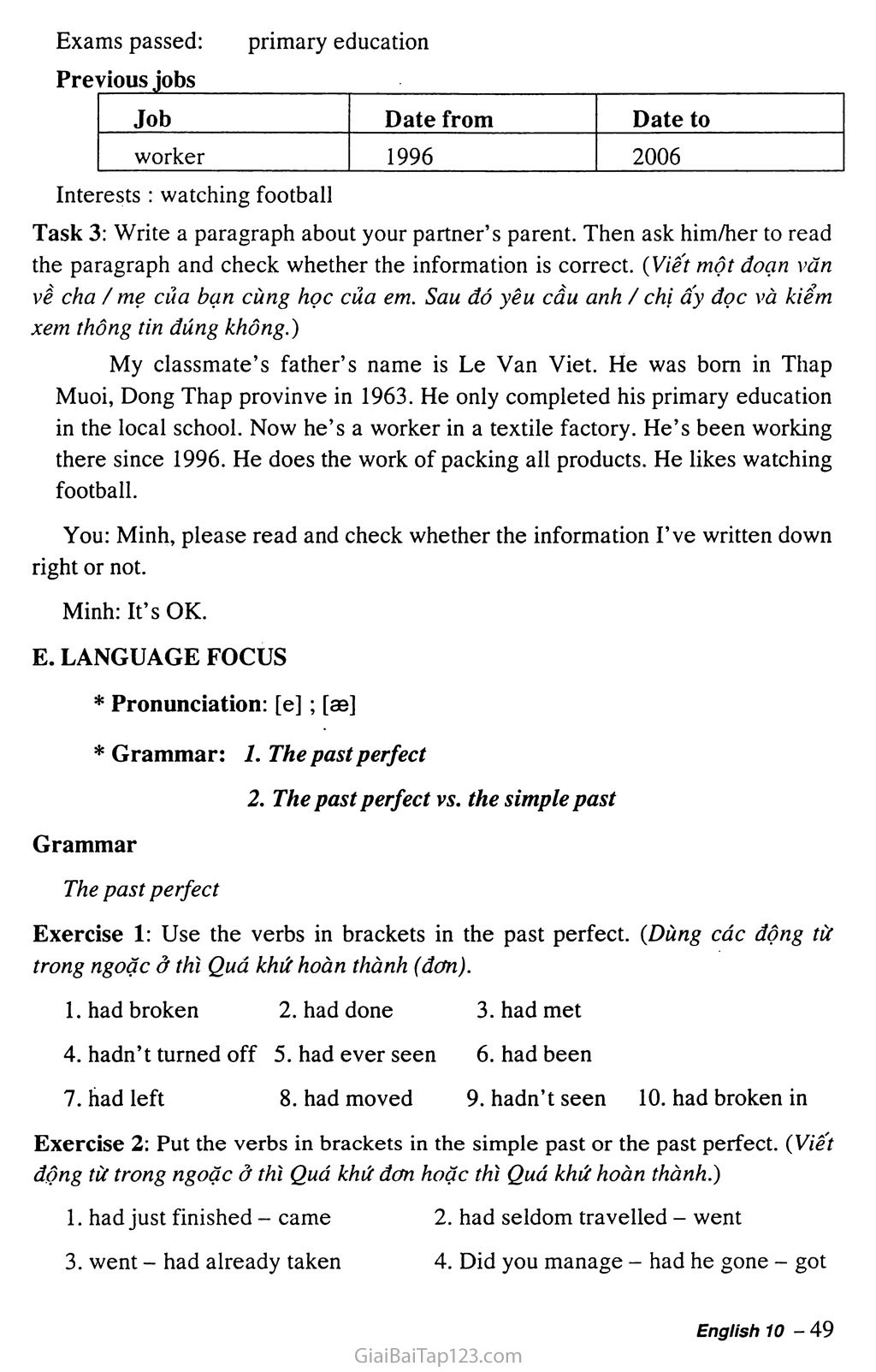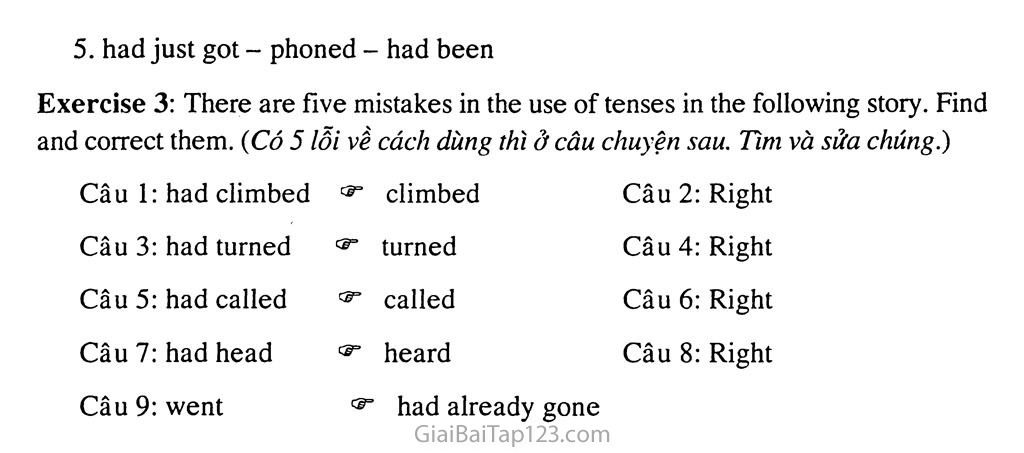Giải tiếng Anh lớp 10 Unit 3: People’s Background
PEOPLE’S BACKGROUND
I. VOCABULARY
background [‘baekgraund] scientist [‘saxentist]
science [‘saions] scientific [saisn’tifik]
specialization [spejslai’zeijn] specialize (in) [‘spejslaiz]
(Lai lịch con người)
(n) : lai lịch, bốì cảnh
(n): nhà khoa học
(n): khoa học
(adj) : thuộc về khoa học
(n): chuyên khoa
(v) : chuyên môn về
e.g.: He specializes in organic chemistry. {Anh ấy chuyên ngành hóa hữu cơ.)
specialized [‘spejolaizd] (adj): chuyên môn về
speciality [speja’aelati]
(n) : specialty : điểm đặc trưng, ngành
chuyên môn
general education [‘(feenarl etfcu’keifn] (n): nền giáo dục phổ thông
training [‘treinip]
(n) : việc đào tạo
train [trein]
(v) : đào tạo, huấn luyện
trainer
(n) : huân luyện viên
trainee [trei’ni:]
(n) : người tập sự
e.g.: He’s a trainee engineer.
(Anh ấy là kỹ sư tập sự.)
brilliant [‘briljant]
(adj) : lỗi lạc
mature [ ma’tjua]
(adj): trưởng thành
maturity [ma’tjoarati]
(n): sự trưởng thành
maturation [matjua’reijn]
(n) : thời kỳ trưởng thành
immature [ima’tjoa]
(adj): không trưởng thành
harbour [*ha:ba]
(v): nuôi dưỡng (n) : cảng biển
tutor [*tju:ta]
(v): giám hộ, dạy kèm
(n) : người giám hộ, giáo viên kèm riêng
live on
(v) : sống bằng
e.g.: His father lives on a small pension.
(Cha anh ấy sống nhờ tiền hưu trí ít ỏi.)
realize [‘rialaiz]
(v) : carry out: thực hiện
realizable [‘rialaizabl]
(adj): khả thi
realization [rialai’zeijn]
(n) : sự thực hiện, sự nhận thức
with flying colors
(expr) : very successful: rất thành công.
from then on
(phr): từ đó trở đi
Ph.D. [pi:eltf ‘di:]
(n) : Doctor of Philosophy: tiến sĩ triết học, bằng tiến sĩ
tragic [‘trsecfeik]
(adj) : bi thảm
tragedy [‘trEetfeadi]
(n) : bi kịch
take up
(v) : take over, undertake: đảm trách
obtain [ab’tein]
(v) : gain: đạt được
obtainable [ab’teinabl]
(adj): có thể đạt được
Nobel Prize [naubel ‘praiz] atomic [ s’tDmik ]
atomic weight atom [‘setsm]
radium [‘reidjsm] ease [i:z]
suffering [‘sAfsrir)] suffer (from) [‘sAfs]
human [‘hjmmsn] humanize [*hju:manaiz]
found [found] founder [‘founds] foundation [faun’deijn]
severe [si’vis] calculation [kselkju’leijn]
calculate [‘kselkjuleit] calculator [‘kaelkjuleits]
Warsaw [lwa:so:] marry [mssri]
(n): giải Nôben
(adj): thuộc về nguyên tử
(n) : trọng lượng nguyên tử
(n) : nguyên tử
(n): chát ra-đi
(v) : làm cho thanh thản
(n) : nỗi / sự đau khổ
(v): đau khổ
(adj) : thuộc về con người, có tính người
(v) : nhân tính hóa
(v) : establish: thành lập, sáng lập
(n): người sáng lập
(n) : nền tảng, nền móng
humanitarian [hju:m£enl’tasrisn] (afj): có tính nhân đạo
(adj) : nghiêm khắc, khắc nghiệt
(n) : sự tính toán
(v) : tính toán
(n): máy tính, người tính
(n) : thủ đô Ba lan
(v): cưới, kết hôn
e.g.: He married a French girl.
(Anh ấy cưới một cô gái Pháp.}
married [‘masrid] (adj) : kết hôn, thuộc về vợ chồng
be married to (v): kết hôn (với)
e.g.: He’s married to a French girl.
(Anh ấy kết hôn/ cưới với một cô gái Pháp.}
will [wil]
strong-willed
ambition [asm’bijn] ambitious [asm’bijss]
humane [‘hjmmein] item [‘aitsm]
itemize [‘aitsmaiz] diploma [di’plsums ]
(n) : ý chi
(adj) : ý chí mạnh mẽ
(n): hoài bão, tham vọng
(adj) : nhiều tham vọng / hoài bão
(adj) : nhân đạo, nhân đức
(n) : tiết mục, món
(v) : ghi thành khoản
(n) : văn bằng
romantic [rso’msentik ] (adj): lãng mạn, viễn vông
romance [roo’masns] (n): tính lãng mạn, chuyện tình lãng mạn
CV[si:vi:] = curriculum vitae[kA‘rikjơl9m ‘vi:tai ] (n): lý lịch
travel agency [ ‘traevl eicfesnsi ]
(n) : văn phòng du lịch
date [deit]
(v) : ghi ngày tháng
journalist [‘43:nolist]
(n) : ký giả
role [roul]
(n): vai trò, vai
GRAMMAR
THE SIMPLE PAST PERFECT ( Thì Quá khứ hoàn thành đơn)
Form (Dạng): Thì Quá khứ hoàn thành đơn được cấu tạo bởi Quá
khứ của trợ động từ have -HAD- và quá khứ phân từ của động từ chính (past participle).
had + past participle (P.P.)
Use (Cách dùng): Thì Quá khứ hoàn thành đơn được dùng diễn tả a. sự kiện xảy ra trước một thời điểm cụ thể hay một sự kiện khác trong quá khứ.
e.g.: Before 1975, he had been a chemical engineer.
(Trước năm 1975, ông ấy là kỹ sư hóa.)
Before she came to Paris, she had received a general education in Warsaw.
(Trước khi đến Pa-rỉ, bà đã có trình độ phổ thông ở Wa-sô.)
By the time he got to the office, everyone had begun the meeting. (Trước lúc anh ấy đến văn phòng, mọi người đã bắt đầu cuộc họp rồi.)
. b. sự kiện xảy ra suốt một khoảng thời gian đến một thời điểm cụ thể hay một sự kiện khác trong quá khứ.
e.g.: In 1975, he had lived in Saigon City for ten years.
(Năm 1975, ông ấy đã sống ở thành phố Sài Gòn được 10 năm.) When he left for Japan, he had studied Japanese for four years. (Khi ông ấy đi Nhật, ông ấy đã học tiếng Nhật bốn năm.)
Chú ý: Đê’ nhấn mạnh sự liên tục của sự kiện, chúng ta dùng Thì Quá khứ hoàn thành tiếp diễn: HAD + BEEN + Present participle (V-ing).
e.g.: In 1975, he had been teaching at Petrus Ky secondary school for ten years.
(Năm 1975, ông ấy đã dạy tqi trường Trung học Petrus Kỷ 10 năm.)
When the fire brigade arrived, people had been fighting with the fire for half an hour.
{Khi đội cứu hỏa đến, dân chúng đã chiến đấu với ngọn lửa nửa giờ rồi.)
B. CONTRASTS: The Simple Past and The Simple Past Perfect {Tương phản giữa Thì Quá khứ đơn và Thì Quá khứ hòan thành đơn.)
Simple Past Simple Past Perfect
trong quá khứ.
e.g.: Before 2001, he had been in Hue.
2. suốt một khoảng thời gian đến một thời điểm cụ thể hay sự kiện khác trong quá khứ.
e.g.: In 1985, he had lived in Hue for five years.
3. Sựkiện đã xảy ra trước một sự kiện khác, e.g.: When he arrived, they had
begun the discussion.
sự kiện xảy ra tại một thời điểm cụ 1. trước một thời điểm cụ thể thể trong quá khứ. e.g. Two days ago, he was in Hue.
sự kiện xảy ra suôi một khoảng thời gian trong quá khứ và đã chấm dứt.
e.g.: He lived in Hue for a year.
Hai sự kiện liên tiếp nối nhau, e.g.: When he arrived, they began the discussion.
III. SOLUTIONS AND TRANSLATIONS {Lời giải và Bài dịch) A. READING {Đọc)
BEFORE YOU READ {Trước khi em đọc)
Work in pairs. Ask and answer the questions. {Làm việc từng đôi. Hỏi và trả lời các câu hỏi.)
I know four scientists: Louis Pasteur, Michael Faraday, Gregor Johann Mendel, and Alexander Fleming.
Louis Pasteur (1822-1895) was a world famous French chemist and biologist.
Michael Faraday (1791-1867) was an English chemist and physicist.
Gregor Johann Mendel( 1822-1884) an Austrian botanist, known as “the Father of Genetics”.
Alexander Fleming (1881-1955) was an English bacteriologist {nhà vi khuẩn học).
Yes. I’ve read some books about her.
Marie Curie was born in Warsaw, Poland, in 1867. In 1891, she came to Paris and studied at the Sorbonne, a world famous university in Paris at that
time. She married Pierre Curie in 1895. In 1903, Marie received a Ph.D at Sorbonne and she was the first woman professor at the Sorbonne after her husband’s death. She was awarded the Nobel Prize in Chemistry. She died in 1934.
WHILE YOU READ {Trong khi em đọc)
Read the passage, and then do the tasks that follow. {Đọc đoạn văn, sau đó làm hài tập theo sau.)
Marie Curie sinh ở Warsaw vào ngày 7 tháng 11 năm 1867. Bà nhận được nền giáo dục phổ thông ở các trường địa phương và sự rèn luyện về khoa học ở cha của bà.
Là một sinh viên lỗi lạc và trưởng thành, bà ôm ấp giấc mơ làm một nghề về khoa học, điều đó không thể được cho một phụ nữ vào thời của bà. Để để dành tiền cho chuyến du học ở nước ngoài, bà phải làm một giáo viên dạy kèm riêng và việc học của bà bị gián đoạn.
Cuối cùng vào năm 1891, với số tiền ít ỏi để sông, Marie đến Pa-ri để thực hiện giâc mơ của mình tại Đại học sórbonne. Dù điều kiện sông khó khăn, bà làm việc vô cùng cần cù. Bà đạt được một văn bằng vật lý với điểm rất cao và tiêp tục một bằng nữa về toán học. Bà gặp Pierre Curie ở Trường Vật lý năm 1894 và năm sau họ cưới nhau. Từ đó trở đi, họ làm việc chung với nhau trong công việc nghiên cứu. Năm 1903, Marie trở thành người phụ nữ đầu tiên nhận bằng tiến sĩ ở Đại học Sorbonne.
Sau cái chết bi thảm của Pierre Curie năm 1906, bà đảm trách vị trí chồng bà đã đạt được ở Sorbonne. Như thế bà là phụ nữ đầu tiên là giáo sư đại học ở Pháp. Chẳng bao lâu sau đó, bà được thưởng giải Nobel về Hóa học về xác định trọng lượng nguyên tử của chất ra-di. Nhưng niềm vui thật sự của bà là “làm giảm đi đau khổ của con người”. Việc thành lập Viện Ra-di năm 1914 làm giác mơ nhân đạo của bà trở thành sự thật.
Task 1: Match the words or phrases in A with their meanings in B. {Ghép những từ hay cụm từ Ở A với nghĩa của chúng ở B.)
1 - c ; 2 - e ; 3 - a ; 4 - d ; 5-b
Task 2: Decide whether the statements are true (T) or false (F). Correct the false information. {Xác định những câu nói này đúng (T) hay sai (F). Điều chỉnh những thông tin sai).
1 : T 2. F (Her dream was to become a scientist.)
T 4. F (She married Pierre Curie in 1985.)
5.T
Task 3: Answer the questions. (Trả lời các câu hỏi).
Marie Curie was born in Warsaw, Poland, in 1867.
She was a brilliant and mature student.
She worked as a private tutor to earn money for her study tour abroad.
She was av/arded a Nobel Prize in Chemistry for determining the atomic weight of radium.
No, it wasn’t. Her real joy was “easing human suffering”.
AFTER YOU READ (Sau khi em đọc)
Work in groups. Below are five adjectives we may use to describe Marie Curie. Find the evidence from the passage to prove each of them.(Lồm việc theo nhóm. Dưới đây là năm tính từ chúng ta có thể dùng để mô tả Marie Curie. Fun những chứng cứ từ đoạn văn ảể chứng minh từng từ trong chúng.)
strong-willed'. With a little money to live on, Marie Curie came to Paris to
realize her dream. In spite of her difficult living conditions, she worked extremely hard.
ambitious: Marie harboured the dream of a scientific career which was impossible for a woman at that time.
hard-working: In spite of her difficult living conditions, she worked extremely hard; to save money for a study tour abroad, she worked as a private tutor; she earned a Physics degree... and went on to take another degree in Mathematics
intelligent: As a brilliant and mature student; she earned a Physics degree with flying colours; the first woman to receive a Ph.D from the Sorbonne; the first woman university professor in France; awarded a Nobel Prize in Chemistry.
humane: her real joy was “easing human suffering”.
B. SPEAKING (Nói)
Task 1: Work in pairs. Decide which of the items below can tell you about somebody’s background. (Làm việc từng đôi. Quyết định xem chủ đề nào trong những chủ đề dưới đây có thể nói cho em về lai lịch của một người.)
- family - education - experience
And then discuss what questions you can ask when you want to know about somebody’s background. (Và sau đó thảo luận những câu hỏi gì em có thê hỏi khi em muốn biết về lai lịch của một người.)
(Suggested questions)
How many people are there in your family?
What do your parents do? (What’re your parents’jobs?)
Where do they work?
What high school did you go to?
What subject did you like best? (What was your favourite subject at school?)
What subject did you like least?
(- When did you complete your secondary education?)
Did you go to university or college?
What subject did you major in?
Did you have any difficulties when you were at school?
What aspect did you find difficult in learning English?
Can you tell me the know-how you use in your study?
Task 2: Imagine you are a journalist. Use the cues below to interview a classmate about her/his background or that of a person he/she knows well. Change the roles when you have finsished. {Tưởng tượng em là một ký giả. Dùng những từ gợi ý dưới đây âể phỏng vấn một bạn cùng lớp về lai lịch của anh/clĩị ấy hay lai lịch của một người bạn ấy biết rõ. Đổi vai khi các em thực hành xong.)
A : Viet, do you know a young or teenage genius our history?
Viet : Oh, yes. I know the one very well. That‘s Le Quy Don.
A : When and where was he born?
Viet : He was born in Phu Hieu village, Hung Ha District, Thai Binh province in 1726.
A : Was he very intelligent when he was still a little boy?
Viet : Yes. When he was 5, he could write poems and essays, and read the
“Kinh Thi”.
A : Did he get any degrees ?
Viet : Oh, he was very brilliant. At the age of 18, he came top in the “Huong” exam. In 1752, he went on to come top in the “Hoi” exam (doctorate degree). And he went to China as an embassador in 1760.
A : Did he write any books?
Viet : Yes. He wrote a lot of books, such as “Thanh mô hien pham”, “Quan
thu khao bien”, and specially two books “Van đai loai ngu” and “Kỉen van tieu luc”, which are still very famous nowadays.
A : What do these two books tell about?
Viet : They tell about philosophy, geography, astronomy, history, agriculture, literature, law, ways and customs, peoples and religions, etc.
A : At his days, he could write about these topics. Indeed Le Quy Don is a real genius of our nation. When did he die?
Viet : He died in 1784.
Task 3: Work in groups. Talk about the person you have known through the interview. (Làm việc theo nhóm. Nói về người em biết qua cuộc phỏng vấn.')
Le Quy Don is a Vietnamese genius. He was bom in Phu Hieu village, Hung Ha district, Thai Binh province. He was very brilliant. When he was a little boy, he could write poems, essays and read the “Kinh Thi”. And when he was 18, he came top in the “Huong” exam. And he went on to come top in the “Hoi” exam in 1752. He went to China as an embassador. He wrote many books about various subjects, such as astronomy, history, geography, law, philosophy, etc. Le Quy Don is really a genius in the Vietnamese scholarship.
c. LISTENING (Nghe)
BEFORE YOU LISTEN (Trước khi em nghe)
Work in pairs. Answer the following questions. (Làm việc từng đôi. Trả lời các câu hỏi sau đây.)
Yes. I know some Olympic champions. They are Nellie Kim, a gymnast from Russia,
I ask how he’s practised to be an Olympic champion and how many times he’s got this championship.
WHILE YOU LISTEN (Trong lúc em nghe)
Task 1: Listen to the conversation between Bob and Sally. Decide whether the statements are true (T) or false (F). (Nghe cuộc đối thoại giữa Bob và Sally. Quyết định những câu nói này đúng (T) hay sai (F)).
l.T 2. T 3. F (I don’t have much free time)
T 5. F (I want to be a sports teacher)
Task 2: Listen to the conversation again and fill in the blanks. (Nghe lại bài đối thoại và điền các chỗ trống.)
1. a general education 2. lives; family 3. different; swimming
love stories 5. teacher’s diploma
TAPESCRIPT
Bob: Congratulations! You are now the Olympic champion.
Sally: Thanks. Yes, Pm very happy.
Bob: Our readers want to know all about you.
Sally: That’s nice! Well, ask me your questions.
Bob: First of all, tell me something about yourself.
Sally: Well, I was born in 1980. I got a general education at local schools and when I was 15, I joined the Star Sports Club near my home.
Bob: Where is your home?
Sally: In Manchester.
Bob: I see. And do you live alone?
Sally: No. I live with my family, my parents and two brothers.
Bob: What do you like to do in your free time?
Sally: Well, I don’t have much free time, but I like different sports - baseball and swimming, for example, and just sitting at home and reading.
Bob: What sort of books do you like?
Sally: Oh , love stories - romantic books.
Bob: And what do you want to be in the future?
Sally: 1 want to be a sports teacher. I’m a student at college. I want to get my teacher’s diploma.
Bob: I see. Now tell me...
AFTER YOU LISTEN (Sau khi em nghe)
Work in pairs. Ask and answer questions about Sally. (Làm việc từng đôi. Hỏi và trả lời câu hỏi về Sally.')
You: Hello, Sally. Can I ask you some questions?
Sally: OK. No problem. What do you want to know?
You: Do you mind telling me about your family?
Sally: Of course not. My parents have three children - my two brothers and me. My brothers both go to work, one is an engineer and the other is a high school teacher.
You: When did you start your sports practice?
Sally: When I was 15.
You: What other sports do you like playing?
Sally: I like swimming and baseball.
You: What do you do in your free time?
Sally: I just sit at home and reading.
You: What kind of books do you like reading?
Sally: Love stories -1 love romantic books.
You: Sally, can you tell me what you want to be in the future?
Sally: I want to be a sports teacher. Now, I’m a college student and I want to get my teacher’s diploma.
You: Thanks a lot for all the answers.
Sally: My pleasure.
D. WRITING (Viết)
Writing about people’s background. (Viết về lai lịch của người)
Task 1: Read Mr Brown’s c.v. (curriculum vitae) - a form with details about somebody’s past education and jobs. (Đọc bản lý lịch của ông Brown (bản lý lịch - mẫu đơn với những chi tiết về việc học vấn và việc làm của một người nào đó.)
Tên : David Brown Ông /
Ngày sanh : 12/11/69
Nơi sinh : Boston
Học vân
Trường theo học : Kensington High School Kỳ thi đã đậu : Anh văn, Pháp văn, Toán Việc làm trưức đây:
Việc làm
Bắt đầu từ
đến
Hướng dẫn viên du lịch
6/1991
12/1998
Điện thoại viên khách sạn
3/1999
5/2002
Sở thích: nhạc và khiêu vũ
And now write a paragraph about Mr Brown, using the cues below. (Và bây giờ viết một đoạn văn về ông Brown, dùng những từ gợi ý bên dưới.)
Mr Brown was bom on November 12th, 1969 in Boston. He went to Kensington High School and passed exams in English, French and Maths. He
worked in a travel agency as a tourist guide from June 1991 to December
1998. And from March 1999 to May 2002, he worked as a hotel telephonist.
He likes music and dancing.
Task 2: Work in pairs. Ask your partner for the information about his/her parent and complete the form. (Lùm việc từng đôi. Hỏi bạn cùng học với em những thông tin về cha/mẹ của anh/chị ấy và điền mẫu đơn.)
You : Minh, can I ask you some questions about your father?
Minh : Yes, of course.
You : Do you mind telling me his name?
Minh : No problem. His name’s Le Van Viet.
You : When and where was your father born?
Minh : He was born in Thap Muoi, Dong Thap in 1963.
You : Where did he go to school?
Minh : He went to the local primary school.
You : Did he complete his secondary education?
Minh : No. He only completed primary education.
You : What does your father do now?
Minh : He’s a worker.
You : Where does he work?
Minh : He’s working in a textile factory (nhà máy dệt).
You : What does he work there exactly?
Minh : He’s in the packing section (bộ phận đóng gói).
You : How long has he been working there?
Minh : For about ten years.
You : What job did he do before this one?
Minh : No. He has just only this one.
You : What’s his interest?
Minh : He likes watching football.
You : Thanks a lot for your information.
Minh : That’s OK.
Name: Le Van Viet Mr/ x'
Date of birth: 1963
Place of birth: Thap Muoi, Dong Thap
Education
School attended: local primary school
Exams passed: primary education
Previous jobs
Job
Date from
worker
1996
Interests : watching football
Task 3: Write a paragraph about your partner’s parent. Then ask him/her to read the paragraph and check whether the information is correct. (Viết một đoạn văn về cha /mẹ cửa bạn cùng học của em. Sau đó yêu cầu anh / chị ấy đọc và kiểm xem thông tin đúng không.)
My classmate’s father’s name is Le Van Viet. He was born in Thap Muoi, Dong Thap provinve in 1963. He only completed his primary education in the local school. Now he’s a worker in a textile factory. He’s been working there since 1996. He does the work of packing all products. He likes watching football.
You: Minh, please read and check whether the information I’ve written down right or not.
Minh: It’s OK.
E. LANGUAGE FOCUS
Pronunciation: [e] ; [as]
Grammar: 1. The past perfect
The past perfect vs. the simple past
Grammar
The past perfect
Exercise 1: Use the verbs in brackets in the past perfect. {Dùng các động từ trong ngoặc ô thì Quá khứ hoàn thành (đơn).
had broken 2. had done 3. had met
hadn’t turned off 5. had ever seen 6. had been
7. had left 8. had moved 9. hadn’t seen 10. had broken in
Exercise 2: Put the verbs in brackets in the simple past or the past perfect. (Viết động từ trong ngoặc ở thì Quá khứ đem hoặc thi Quá khứ hoàn thành.)
1. had just finished - came 2. had seldom travelled - went
went - had already taken 4. Did you manage - had he gone - got
had just got - phoned - had been
Exercise 3: There are five mistakes in the use of tenses in the following story. Find and coưect them. (Co 5 lỗi về cách dùng thì ở câu chuyện sau. Tìm và sửa chúng.')
Câu 1: had climbed
climbed
Câu 2: Right
Câu 3: had turned
turned
Câu 4: Right
Câu 5: had called
called
Câu 6: Right
Câu 7: had head
heard
Câu 8: Right
Câu 9: went
had already gone

